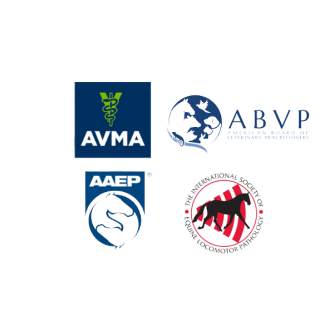Northwest Equine Veterinary Associates

Parasite Control
Parasite control is very important in helping your horse maintain good health and body condition. Environmental management is also very useful in controlling parasite loads. Removing stool from paddocks and pastures every 2-3 days before the eggs hatch into larvae will greatly reduce pasture contamination. Reducing crowding and avoiding mixing with other horses that are not on a deworming program is strongly recommended. Performing fecal exams for parasite egg counts once a year or every other year can be an effective way of monitoring if your deworming program is working effectively or needs to be re-evaluated.
A good deworming program must include antiparasitic drugs that eliminate roundworms, strongyles (large and small), stomach bots, Strongyloides, tapeworms, and encysted small strongyles.

Roundworms (ascarids), pinworms, strongyles (large and small), stomach bots, and Strongyloides are commonly observed in horses. A very heavy load will often lead to clinical signs such as poor body condition, weight loss, large "pot-belly" appearance, and a poor hair coat, among others. Fecal tests to check for roundworm and strongyle eggs can easily be performed to evaluate your horse. The drugs most commonly used to treat these are ivermectin (Eqvalan, Equimax, among many others), moxidectin (Quest), fenbendazole (Panacur), and pyrantel (Strongid). Ivermectin and moxidectin are more efficient in treating horses for most roundworms and small strongyles.

Tapeworms can be a cause of colic in horses as they accumulate in the ileocecal junction of the horse’s intestine causing an obstruction. Horses with tapeworms often appear in great condition and perform well but may occasionally experience mild colic episodes that resolve with Banamine and walking and eventually may end up having a severe and/or fatal episode that requires colic surgery. Many cases have been confirmed in Western Washington. It is very difficult to detect tapeworm eggs in a traditional fecal test, however, there is a blood test available for the detection of antibodies against tapeworms in horses. For treatment, it is important to include drugs such as praziquantel (included with ivermectin in Equimax and with moxidectin in Quest Plus) or pyrantel at twice the normal dose (Strongid, others) that help in clearing tapeworms in your horse's program.
Small cysts containing small strongyle larvae in a state of hypobiosis often accumulate within the wall of the large intestine over the years. With time, the presence of encysted small strongyles on the wall on the intestine may lead the horse to experience subtle difficulty gaining weight, weight loss, poor condition, suboptimal fat and muscle disposition, mild colics, and watery stool. At some point, if the encysted larvae emerge from the cysts, severe illness can occur. This form of parasite cannot be detected in a traditional fecal egg count test and currently, we do not have routine diagnostic testing available for these cases. Therefore, it is important to use a product that removes these encysted larvae once a year. Moxidectin (Quest) is the only drug that reliably eliminates larval small strongyles. This product is best given in the fall after the first frost. A double dose of fenbendazole given daily for five days (the Panacur PowerPac) has been useful in the past, but the encysted larval stages have begun to develop resistance to this product. Testing should be performed before routinely relying on this product to eliminate larval stages of parasites on your farm.
In recent years, we have begun to see the development of resistance to our commonly used dewormers. As a result, we try to follow a targeted deworming protocol to deworm as little as possible and to treat only the horses that need treatment. Each horse has his/her own innate immunity to parasites; we classify them into groups determined by their predisposition for parasite infection and egg shedding. In a group of adult horses, it has been found that 20-30% of the horses will shed 80% of the parasite eggs; these are the horses that need to be treated more frequently. The remainder of the horses that shed only 20% of the parasite eggs need to be dewormed far less frequently. The limits of fecal egg counts are mentioned above: tapeworms and encysted small strongyles are not routinely detected on fecal egg counts. Because of this, all horses still need to be dewormed twice yearly to treat for these parasites.
We advocate vaccinating all horses whether they travel frequently or mostly stay at home, as well as foals and broodmares. Depending on their routines, past history, and potential for exposure to certain diseases, however, the specifics of the program and the frequency of the shots will vary. Please refer to our vaccination charts for general recommendations.
We recommend discussing this topic with your veterinarian so that a plan tailored to your particular horse and/or facility condition can be implemented. It is important to remember that the true goal of parasite control is to limit parasite infections so that horses remain healthy and disease-free. The goal is not to completely eradicate all parasites from every horse; doing so would lead to drug resistance even sooner.
Recommendations for deworming based on Fecal Egg Counts (only for horses >3 years of age)
Low Shedder (<200 eggs per gram on 2 consecutive fecal egg counts): Spring (March-April): Fecal Egg Count* to make sure still a low shedder, Deworm with Ivermectin (Eqvalan, Ivercare, etc) or Moxidectin/praziquantel (Quest Plus)Fall (September-October): Moxidectin/praziquantel (Quest Plus) or Ivermectin
Moderate Shedder (200-500 eggs per gram on 2 consecutive fecal egg counts): Spring (March-April): Fecal Egg Count*, Ivermectin or Quest PlusSummer (July-August): Pyrantel (if still effective on the farm**)Fall (September-October): Wait at least 2 months after pyrantel and Quest Plus or Ivermectin
High Shedder (>500 eggs per gram on 2 consecutive fecal egg counts): Spring (March-April): Fecal Egg Count*, Ivermectin or Quest PlusSummer (June-July): IvermectinFall (September-October): Quest Plus or IvermectinWinter (January-February): Pyrantel
*Fecal egg counts for classification of horses into shedding categories should be performed a certain period of time after the last dewormer has been administered to allow the parasite population to build up so it can be detected on the test. At least 8 weeks should pass after pyrantel (Strongid) and fenbendazole (Panacur), at least 12 weeks should pass after ivermectin, and at least 16 weeks should pass after moxidectin.
**To determine if a drug is still effective on the farm, a fecal egg count reduction test should be performed. This consists of performing a fecal egg count before deworming and again 14 days after deworming with a product. We look at the percentage of decrease in the fecal egg count to make sure the product is still effective.
Foal Deworming (Mares should be dewormed with ivermectin within 1 month prior to foaling)
2 months: Fenbendazole foal dose daily for 5 consecutive days
4 months: Ivermectin
6 months (or just before weaning): Fecal egg count to determine the population of parasites and deworm appropriately (oxibendazole if ascarids predominate or ivermectin if strongyles predominate)
9 months: Pyrantel
12 months: Ivermectin with praziquantel (Equimax, Zimectrin Gold)
Yearlings and Two-year-olds: Deworm as above for high shedders

